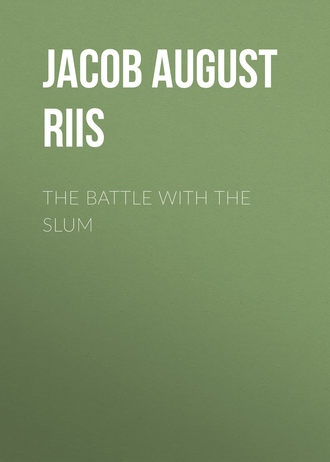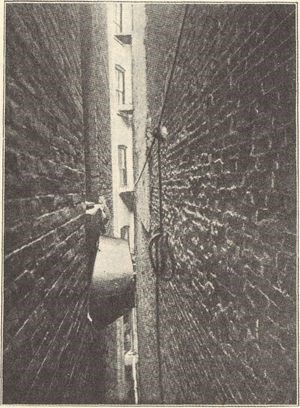 полная версия
полная версияThe Battle with the Slum
Here is a block of tenements inhabited by poor Jews. Most of the Jews who live over here are poor; and the poorer they are, the higher rent do they pay, and the more do they crowd to make it up between them. "The destruction of the poor is their poverty." It is only the old story in a new setting. The slum landlord's profits were always the highest. He spends nothing for repairs, and lays the blame on the tenant. The "district leader" saves him, when Tammany is at the helm, unless he is on the wrong side of the political fence, in which case the Sanitary Code comes handy, to chase him into camp. A big "order" on his house is a very effective way of making a tenement-house landlord discern political truth on the eve of an important election. Just before the election which put Theodore Roosevelt in the Governor's chair at Albany the sanitary force displayed such activity as had never been known till then in the examination of tenements belonging very largely, as it happened, to sympathizers with the gallant Rough Rider's cause; and those who knew did not marvel much at the large vote polled by the Tammany candidate in the old city.
The halls of these tenements are dark. Under the law there should be a light burning, but it is one of the rarest things to find one. The thing seems well-nigh impossible of accomplishment. When the Good Government Clubs set about backing up the Board of Health in its efforts to work out this reform, which comes close to being one of the most necessary of all,—such untold mischief is abroad in the darkness of these thoroughfares,—the sanitary police reported 12,000 tenement halls unlighted by night, even, and brought them, by repeated orders, down to less than 1000 in six months. I doubt that the light burned in 1000 of them all a month after the election that brought Tammany back. It is so easy to put it out when the policeman's back is turned. Gas costs money. Let what doesn't take care of itself.
We had a curious instance, at the time, of the difficulties that sometimes beset reform. Certain halls that were known to be dark were reported sufficiently lighted by the policeman of the district, and it was discovered that it was his standard that was vitiated. He himself lived in a tenement, and was used to its gloom. So an order was issued defining darkness to the sanitary police: if the sink in the hall could be made out, and the slops overflowing on the floor, and if a baby could be seen on the stairs, the hall was light; if, on the other hand, the baby's shrieks were the first warning that it was being trampled upon, the hall was dark. Some days later the old question arose about an Eldridge Street tenement. The policeman had reported the hall light enough. The President of the Board of Health, to settle it once for all, went over with me, to see for himself. The hall was very dark. He sent for the policeman.
"Did you see the sink in that hall?" he asked.
The policeman said he did.
"But it is pitch dark. How did you see it?"
"I lit a match," said the policeman.
Four families live on these floors, with heaven knows how many children. It was here the police commissioners were requested, in sober earnest, some years ago, by a committee of very practical woman philanthropists, to have the children tagged, as they do in Japan, I am told, so as to save the policeman wear and tear in taking them back and forth between the Eldridge Street police station and headquarters, when they got lost. If tagged, they could be assorted at once and taken to their homes. Incidentally, the city would save the expense of many meals. It was shrewdly suspected that the little ones were lost on purpose in a good many cases, as a way of getting them fed at the public expense.

One Family's Outlook on the Air Shaft. The Mother said, "Our Daughter does not care to come Home to Sleep."
That the children preferred the excitement of the police station, and the distinction of a trip in charge of a brass-buttoned guardian, to the Ludlow Street flat is easy enough to understand. A more unlovely existence than that in one of these tenements it would be hard to imagine. Everywhere is the stench of the kerosene stove that is forever burning, serving for cooking, heating, and ironing alike, until the last atom of oxygen is burned out of the close air. Oil is cheaper than coal. The air shaft is too busy carrying up smells from below to bring any air down, even if it is not hung full of washing in every story, as it ordinarily is. Enterprising tenants turn it to use as a refrigerator as well. There is at least a draught of air, such as it is. When fire breaks out, this draught makes of the air shaft a flue through which the fire roars fiercely to the roof, so transforming what was meant for the good of the tenants into their greatest peril. The stuffy rooms bring to mind this denunciation of the tenement builder of fifty years ago by an angry writer, "He measures the height of his ceilings by the shortest of the people, and by thin partitions divides the interior into as narrow spaces as the leanest carpenter can work in." Most decidedly, there is not room to swing the proverbial cat in any one of them. In one I helped the children, last holiday, to set up a Christmas tree, so that a glimpse of something that was not utterly sordid and mean might for once enter their lives. Three weeks after, I found the tree standing yet in the corner. It was very cold, and there was no fire in the room. "We were going to burn it," said the little woman, whose husband was then in the insane asylum, "and then I couldn't. It looked so kind o' cheery-like there in the corner." My tree had borne the fruit I wished.
It remained for the New York slum landlord to assess the exact value of a ray of sunlight,—upon the tenant, of course. Here are two back-to-back rear tenements, with dark bedrooms on the south. The flat on the north gives upon a neighbor's yard, and a hole two feet square has been knocked in the wall, letting in air and sunlight; little enough of the latter, but what there is is carefully computed in the lease. Six dollars for this flat, six and a half for the one with the hole in the wall. Six dollars a year per ray. In half a dozen houses in this block have I found the same rate maintained. The modern tenement on the corner goes higher: for four front rooms, "where the sun comes right in your face," seventeen dollars; for the rear flat of three rooms, larger and better every other way, but always dark, like the capmaker's, eleven dollars. From the landlord's point of view, this last is probably a concession. But he is a landlord with a heart. His house is as good a one as can be built on a twenty-five-foot lot. The man who owns the corner building in Orchard Street, with the two adjoining tenements, has no heart. In the depth of last winter I found a family of poor Jews living in a coop under his stairs, an abandoned piece of hallway, in which their baby was born, and for which he made them pay eight dollars a month. It was the most outrageous case of landlord robbery I had ever come across, and it gave me sincere pleasure to assist the sanitary policeman in curtailing his profits by even this much. The hall is not now occupied.
The Jews under the stairs had two children. The shoemaker in the cellar next door had three. They were fighting and snarling like so many dogs over the coarse food on the table before them, when we looked in. The baby, it seems, was the cause of the row. He wanted it all. He was a very dirty and a very fierce baby, and the other two children were no match for him. The shoemaker grunted fretfully at his last, "Ach, he is all de time hungry!" At the sight of the policeman, the young imp set up such a howl that we beat a hasty retreat. The cellar "flat" was undoubtedly in violation of law, but it was allowed to pass. In the main hall, on the ground floor, we counted seventeen children. The facts of life here suspend ordinary landlord prejudices to a certain extent. Occasionally it is the tenant who suspends them. The policeman laughed as he told me of the case of a mother who coveted a flat into which she well knew her family would not be admitted; the landlord was particular. She knocked, with a troubled face, alone. Yes, the flat was to let; had she any children? The woman heaved a sigh. "Six, but they are all in Greenwood." The landlord's heart was touched by such woe. He let her have the flat. By night he was amazed to find a flock of half a dozen robust youngsters domiciled under his roof. They had indeed been in Greenwood; but they had come back from the cemetery to stay. And stay they did, the rent being paid.
High rents, slack work, and low wages go hand in hand in the tenements as promoters of overcrowding. The rent is always one-fourth of the family income, often more. The fierce competition for a bare living cuts down wages; and when loss of work is added, the only thing left is to take in lodgers to meet the landlord's claim. The Jew usually takes them singly, the Italian by families. The midnight visit of the sanitary policeman discloses a state of affairs against which he feels himself helpless. He has his standard: 400 cubic feet of air space for each adult sleeper, 200 for a child. That in itself is a concession to the practical necessities of the case. The original demand was for 600 feet. But of 28,000 and odd tenants canvassed in New York, in the slumming investigation prosecuted by the general government in 1894, 17,047 were found to have less than 400 feet, and of these 5526 slept in unventilated rooms with no windows. No more such rooms have been added since; but there has come that which is worse.
It was the boast of New York, till a few years ago, that at least that worst of tenement depravities, the one-room house, too familiar in the English slums, was practically unknown here. It is not so any longer. The evil began in the old houses in Orchard and Allen streets, a bad neighborhood, infested by fallen women and the thievish rascals who prey upon their misery,—a region where the whole plan of humanity, if plan there be in this disgusting mess, jars out of tune continually. The furnished-room house has become an institution here, speeded on by a conscienceless Jew who bought up the old buildings as fast as they came into the market, and filled them with a class of tenants before whom charity recoils, helpless and hopeless. When the houses were filled, the crowds overflowed into the yard. In one, I found, in midwinter, tenants living in sheds built of odd boards and roof tin, and paying a dollar a week for herding with the rats. One of them, a red-faced German, was a philosopher after his kind. He did not trouble himself to get up, when I looked in, but stretched himself in his bed,—it was high noon,—responding to my sniff of disgust that it was "sehr schoen! ein bischen kalt, aber was!" His neighbor, a white-haired old woman, begged, trembling, not to be put out. She would not know where to go. It was out of one of these houses that Fritz Meyer, the murderer, went to rob the poor box in the Redemptorist Church, the night when he killed policeman Smith. The policeman surprised him at his work. In the room he had occupied I came upon a brazen-looking woman with a black eye, who answered the question of the officer, "Where did you get that shiner?" with a laugh. "I ran up against the fist of me man," she said. Her "man," a big, sullen lout, sat by, dumb. The woman answered for him that he was a mechanic.
"What does he work at?" snorted the policeman, restraining himself with an effort from kicking the fellow.
She laughed scornfully, "At the junk business." It meant that he was a thief.
Young men, with blotched faces and cadaverous looks, were loafing in every room. They hung their heads in silence. The women turned their faces away at the sight of the uniform. They cling to these wretches, who exploit their starved affections for their own ease, with a grip of desperation. It is their last hold. Women have to love something. It is their deepest degradation that they must love these. Even the wretches themselves feel the shame of it, and repay them by beating and robbing them, as their daily occupation. A poor little baby in one of the rooms gave a shuddering human touch to it all.
The old houses began it, as they began all the tenement mischief that has come upon New York. But the opportunity that was made by the tenant's need was not one to be neglected. In some of the newer tenements, with their smaller rooms, the lodger is by this time provided for in the plan, with a special entrance from the hall. "Lodger" comes, by an easy transition, to stand for "family." One winter's night I went with the sanitary police on their midnight inspection through a row of Elizabeth Street tenements which I had known since they were built, seventeen or eighteen years ago. That is the neighborhood in which the recent Italian immigrants crowd. In the house which we selected for examination, in all respects the type of the rest, we found forty-three families where there should have been sixteen. Upon each floor were four flats, and in each flat three rooms that measured respectively 14 × 11, 7 × 11, and 7 × 8-1/2 feet. In only one flat did we find a single family. In three there were two to each. In the other twelve each room had its own family living and sleeping there. They cooked, I suppose, at the one stove in the kitchen, which was the largest room. In one big bed we counted six persons, the parents and four children. Two of them lay crosswise at the foot of the bed, or there would not have been room. A curtain was hung before the bed in each of the two smaller rooms, leaving a passageway from the hall to the room with the windows. The rent for the front flats was twelve dollars; for that in the rear ten dollars. The social distinctions going with the advantage of location were rigidly observed, I suppose. The three steps across a tenement hall, from the front to "the back," are often a longer road than from Ludlow Street to Fifth Avenue.
They were sweaters' tenements. But I shall keep that end of the story until I come to speak of the tenants. The houses I have in mind now. They were Astor leasehold property, and I had seen them built upon the improved plan of 1879, with air shafts and all that. There had not been water in the tenements for a month then, we were told by the one tenant who spoke English that could be understood. The cold snap had locked the pipes. Fitly enough, the lessee was an undertaker, an Italian himself, who combined with his business of housing his people above and below the ground also that of the padrone, to let no profit slip. He had not taken the trouble to make many or recent repairs. The buildings had made a fair start; they promised well. But the promise had not been kept. In their premature decay they were distinctly as bad as the worst. I had the curiosity to seek out the agent, the middleman, and ask him why they were so. He shrugged his shoulders. With such tenants nothing could be done, he said. I have always held that Italians are most manageable, and that, with all the surface indications to the contrary, they are really inclined to cleanliness, if cause can be shown, and I told him so. He changed the subject diplomatically. No doubt it was with him simply a question of the rent. They might crowd and carry on as they pleased, once that was paid; and they did. It used to be the joke of Elizabeth Street that when the midnight police came, the tenants would keep them waiting outside, pretending to search for the key, until the surplus population of men had time to climb down the fire-escape. When the police were gone they came back. We surprised them all in bed.
Like most of the other tenements we have come across on our trip, these were double-deckers. That is the type of tenement that is responsible for the crowding that till now has gone on unchecked. For twenty years it has been replacing the older barracks everywhere, as fast as they rotted or were torn down.
This double-decker was thus described by the Tenement House Commission of 1894: "It is the one hopeless form of tenement construction. It cannot be well ventilated, it cannot be well lighted; it is not safe in case of fire. It is built on a lot 25 feet wide by 100 or less in depth, with apartments for four families in each story. This necessitates the occupation of from 86 to 90 per cent of the lot's depth. The stairway, made in the centre of the house, and the necessary walls and partitions reduce the width of the middle rooms (which serve as bedrooms for at least two people each) to 9 feet each at the most, and a narrow light and air shaft, now legally required in the centre of each side wall, still further lessens the floor space of these middle rooms. Direct light is only possible for the rooms at the front and rear. The middle rooms must borrow what light they can from dark hallways, the shallow shafts, and the rear rooms. Their air must pass through other rooms or the tiny shafts, and cannot but be contaminated before it reaches them. A five-story house of this character contains apartments for eighteen or twenty families, a population frequently amounting to 100 people, and sometimes increased by boarders or lodgers to 150 or more."

The only Bath-Tub in the Block: it hangs in the Air Shaft.
The commission, after looking in vain through the slums of the Old World cities for something to compare the double-deckers with, declared that, in their setting, the separateness and sacredness of home life were interfered with, and evils bred, physical and moral, that "conduce to the corruption of the young." "Make for unrighteousness" said the commission of 1900, six years later.
Yet it is for these that the "interests" of which the fire-chief spoke have rushed into battle at almost every session of the legislature, whenever a step was taken to arraign them before the bar of public opinion. No winter has passed, since the awakening conscience of the people of New York City manifested itself in a desire to better the lot of the other half, that has not seen an assault made, in one shape or another, on the structure of tenement-house law built up with such anxious solicitude. Once a bill to exempt from police supervision, by withdrawing them from the tenement-house class, the very worst of the houses, whose death-rate threatened the community, was sneaked through the legislature all unknown, and had reached the executive before the alarm was sounded. The Governor, put upon his guard, returned the bill, with the indorsement that he was unable to understand what could have prompted a measure that seemed to have reason and every argument against it and none for it.
But the motive is not so obscure, after all. It is the same old one of profit without conscience. It took from the Health Department the supervision of the light, ventilation, and plumbing of the tenements, which by right belonged there, and put it in charge of a compliant Building Department, "for the convenience of architects and their clients, and the saving of time and expense to them." For the convenience of the architect's client, the builder, the lot was encroached upon, until of one big block which the Gilder Commission measured only 7 per cent was left open to the air; 93 per cent of it was covered with brick and mortar. Rear tenements, to the number of nearly 100, have been condemned as "slaughter-houses," with good reason, but this block was built practically solid. The average of space covered in 34 tenement blocks was shown to be 78.13 per cent. The law allowed only 65. The "discretion" that penned tenants in a burning tenement with stairs of wood for the builder's "convenience" cut down the chance of life of their babies unmoved. Sunlight and air mean just that, where three thousand human beings are packed into a single block. That was why the matter was given into the charge of the health officials, when politics was yet kept out of their work.

The Old Style of Tenements, with Yards.
Of such kind are the interests that oppose betterment of the worker's hard lot in New York, that dictated the appointment by Tammany of a commission composed of builders to revise its code of tenement laws, and that sneered at the "laughable results of the Gilder Tenement House Commission." Those results made for the health and happiness and safety of a million and a half of souls, and were accounted, on every humane ground, the longest step forward that had been taken by this community. For the old absentee landlord, who did not know what mischief was afoot, we have got the speculative builder, who does know, but does not care, so long as he gets his pound of flesh. Half of the just laws that have been passed for the relief of the people he has paralyzed with his treacherous discretion clause, carefully nursed in the school of practical politics to which he gives faithful adherence. The thing has been the curse of our city from the day when the earliest struggle toward better things began. Among the first manifestations of that was the prohibition of soap factories below Grand Street by the Act of 1797, which created a Board of Health with police powers. The act was passed in February, to take effect in July; but long before that time the same legislature had amended it by giving the authorities discretion in the matter. And the biggest soap factory of them all is down there to this day, and is even now stirring up a rumpus among the latest immigrants, the Syrians, who have settled about it. No doubt it is all a question of political education; but is not a hundred years enough to settle this much, that compromise is out of place where the lives of the people are at stake, and that it is time our years of "discretion" were numbered?

As a Solid Block of Double-deckers. Lawful until now, would appear.
At last there comes for the answer an emphatic yes. This year the law has killed the discretionary clause and spoken out plainly. No more stairs of wood; no more encroachment on the tenants' sunlight; and here, set in its frame of swarming tenements, is a wide, open space, yet to be a real park, with flowers and grass and birds to gladden the hearts of those to whom such things have been as tales that are told, all these dreary years, and with a playground in which the children of yonder big school may roam at will, undismayed by landlord or policeman. Not all the forces of reaction can put back the barracks that were torn down as one of the "laughable results" of that very Tenement House Commission's work, or restore to the undertaker his profits from Bone Alley of horrid memory. It was the tenant's turn to laugh, that time. Half a dozen blocks away, among even denser swarms, is another such plot, where there will be football and a skating pond before another season. They are breaking ground to-day. Seven years of official red tape have we had since the plans were first made, and it isn't all unwound yet; but it will be speedily now, and we shall hear the story of those parks and rejoice that the day of reckoning is coming for the builder without a soul. Till then let him deck the fronts of his tenements with bravery of plate glass and brass to hide the darkness within. He has done his worst.
We can go no farther. Yonder lies the river. A full mile we have come, through unbroken ranks of tenements with their mighty, pent-up multitudes. Here they seem, with a common impulse, to overflow into the street. From corner to corner it is crowded with girls and children, dragging babies nearly as big as themselves, with desperate endeavor to lose nothing of the show. There is a funeral in the block. Unnumbered sewing-machines cease for once their tireless rivalry with the flour mill in the next block, that is forever grinding in a vain effort to catch up. Heads are poked from windows. On the stoops hooded and shawled figures have front seats. The crowd is hardly restrained by the policeman and the undertaker in holiday mourning, who clear a path by main strength to the plumed hearse. The eager haste, the frantic rush to see,—what does it not tell of these starved lives, of the quality of their aims and ambitions? The mill clatters loudly; there is one mouth less to fill. In the midst of it all, with clamor of urgent gong, the patrol wagon rounds the corner, carrying two policemen precariously perched upon a struggling "drunk," a woman. The crowd scatters, following the new sensation. The tragedies of death and life in the slum have met together.









